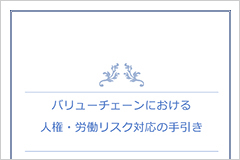Through their products, services, and business activities, JCIA members contribute to the realization of a fair and inclusive world in which diversity, personality, and individuality are respected and diverse human resources are able to participate actively regardless of age, gender, disability, ethnicity, race, origin, religion, etc. In addition to the initiatives within companies, they also work on cooperation with their suppliers and give consideration to advertising expressions.
All people are born with human rights. But with the development of economic activities and the globalization of businesses, cases of human rights violations caused by business activities have been reported. To respond, in 2011, the United Nations established the Guiding Principles on Business and Human Rights (the Ruggie’s Principles). Legislation movement based on these principles is accelerating both in Japan and overseas.
In Japan, the National Action Plan on Business and Human Rights was published in 2020. The Plan points out implementation of human rights due diligence as a particular expectation for businesses. In addition, the revision of the Corporate Governance Code in 2021 indicated appropriate responses to sustainability issues, including respect for human rights. In the summer of 2022, “Business and Human Rights”: Towards a Responsible Value Chain” was formulated. The JCIA identified human rights risks within the scope of our business impact and created a guideline to support accelerating efforts to reduce risks.
HOME > Our Approach > Initiatives for Sustainability > For Each and Everyone, for All People: Initiatives for Social Issues


